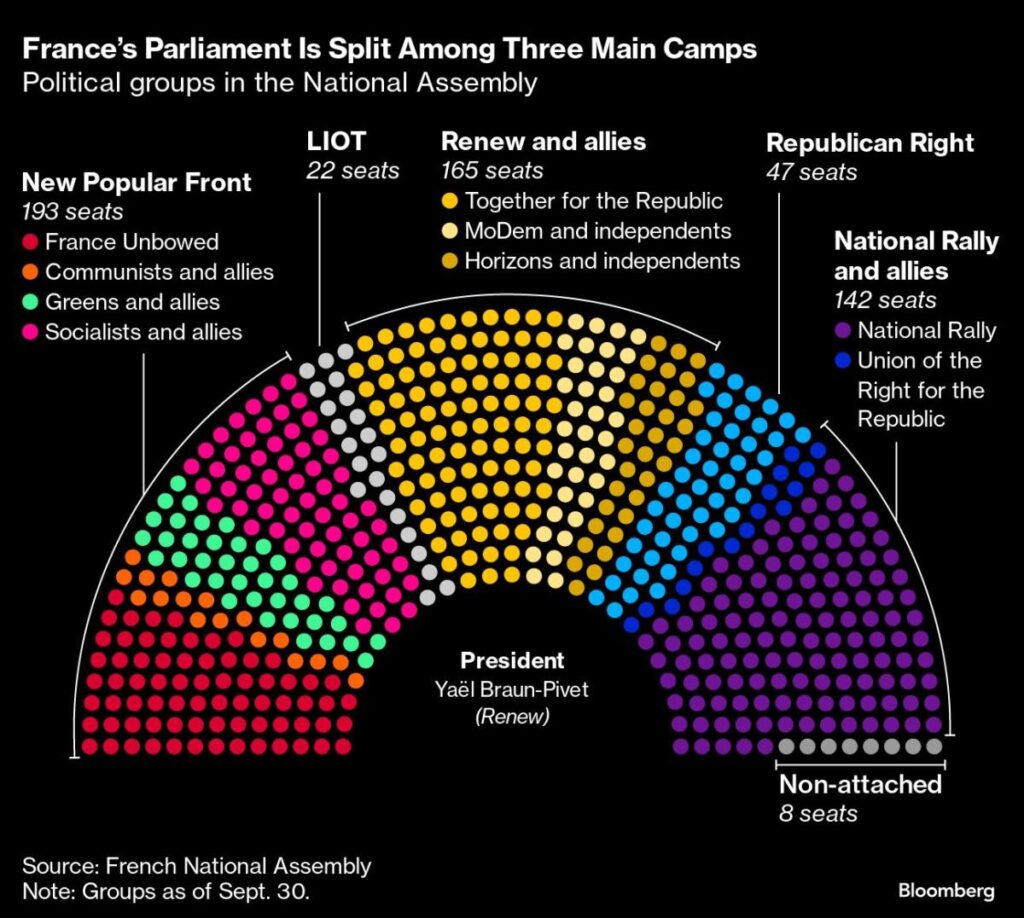Marine Le Pen’s assertive demands directed at French Prime Minister Michel Barnier underscore the significant influence she holds within the French political landscape. Following weeks of escalating threats to orchestrate a no-confidence vote against Barnier’s government, the Prime Minister capitulated by scrapping plans for a tax increase on electricity slated for 2025, marking a key concession to Le Pen’s National Rally party. Despite this concession, Le Pen reiterated her stance, issuing a new ultimatum with a clear deadline. Her demands for adjustments to the 2025 budget include initiatives to forsake proposed reductions in drug reimbursements and a moratorium on new or increased personal taxes, illustrating her intention to wield her newfound power effectively. This scenario paints a stark contrast to her party’s earlier relegation during the legislative elections, where a coalition sought to maintain her exclusion from power, and signals her newfound dominance in the political dialogue.
As France gears up for a tumultuous week, uncertainty surrounding the governance of Barnier has caused jitters in financial markets, leading to a spike in the country’s borrowing costs. Investors have reacted to the unstable political climate by selling French assets, which in turn has widened the yield spread of France’s 10-year bonds over those of Germany. The political turbulence has its roots in President Emmanuel Macron’s decision to call for snap elections, a move intended to establish a clearer mandate amidst a National Assembly already lacking a definitive majority. However, what emerged instead was a fragmented lower house dominated by three antagonistic blocs: a diminished center, a reinvigorated leftist alliance, and a far-right faction led by Le Pen, which has consequently positioned her as a pivotal player amidst the political chaos.
Le Pen’s current role as a self-identified power broker comes into clearer focus with the impending review of Barnier’s budget by the National Assembly, where her support is deemed crucial for the government’s survival. As Barnier considers utilizing article 49.3 to push the budget bill through without a vote, Le Pen’s response will be determinative; her abstention could stave off a no-confidence vote that would threaten the stability of the ruling government. On the other hand, the leftist bloc, comprising multiple parties, has vowed to oppose the government’s actions if Barnier does not accommodate some of their policy proposals, creating a complex political environment where alliances and rivalries could shift dramatically.
In exchange for her potential abstention in a vote of no-confidence, Le Pen is demanding not only amendments to the budget but also a public acknowledgment from Barnier that shows respect for her party’s voter base. This demand highlights her strategy to consolidate her influence and appeal to National Rally voters by framing the government’s concessions as directly resulting from her party’s pressure. Le Pen’s insistence on visible respect serves a dual purpose, reinforcing her image as a formidable political figure who can command the attention of established political players while also energizing her base by portraying herself as their unwavering advocate.
This political moment also illustrates Le Pen’s striking transformation from a once politically precarious figure to a frontrunner for the upcoming presidential election in 2027, provided she can navigate through ongoing legal troubles stemming from an embezzlement trial. Although facing potential disqualification from running due to her trial, recent polls suggest that she retains substantial support among voters. Her increasing prominence can be attributed to strategic shifts away from her father’s overtly nationalist and racist rhetoric, softening her stance to garner broader appeal while leveraging the anxieties surrounding economic instability and immigration issues that resonate with many citizens.
In contrast to her past vulnerabilities, such as the ridicule following a poor debate performance against Macron in 2017, Le Pen’s current stature reflects years of diligent efforts to mainstream her party. The evolution of her image, alongside the growing acceptance of far-right politics globally, has positioned her as a critical player in a politically fragmented France. As the National Assembly prepares for upcoming debates, the interplay between Le Pen and Barnier could have lasting implications not just for their respective parties, but for the political and economic landscape of France as a whole. The unfolding situation and its ramifications serve as a reminder of the crucial interplay between politics and governance and highlight how even perceived political weaknesses can transform into strategic opportunities amid a changing electoral environment.

